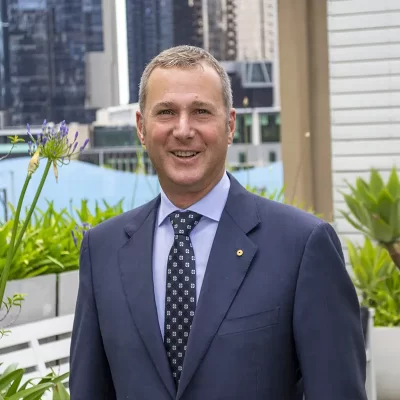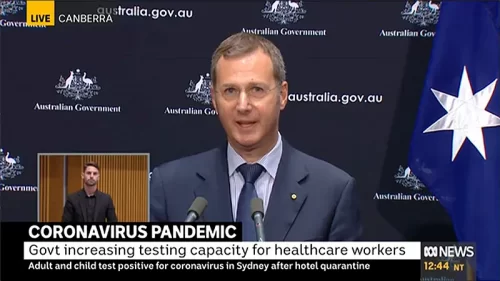Professor Kidd has served as the GPSN patron since 2007 and as the GPRA patron since 2015; he has a passion for inspiring, mentoring and supporting future general practitioner leaders in Australia and around the world.
“I didn’t start to get involved in medical leadership roles until I was a GP registrar. I was an academic GP registrar at Monash University and was provided by senior colleagues with some wonderful opportunities to grow and develop as a medical leader. That experience started me on both my academic career and my career as a medical leader.”
But it was years earlier, during his GP placement as a medical student, that Professor Kidd first discovered his passion for general practice, with the inspirational guidance of Dr Donald Cordner sparking the flame.
“Dr Don Cordner was an inspirational GP who worked on the outer fringes of Melbourne in a semi-rural practice. After finishing his medical training, he served in World War II and, after he came back to Australia, set up his general practice where he practised for decades. He was also a champion football player and won the Brownlow Medal in 1946.”
“He was respected by the people in his local community. Every morning he’d see patients in his clinic and then he’d get in his car and drive around the surrounding rural areas visiting his elderly patients and providing palliative care to people with advanced cancer and supporting them to die in their own homes. He was a valued and important member of his local community, I remember thinking, ‘Wow, what an extraordinary community leader, I want a career like this where I can make a real and positive impact in people’s lives.’
According to Professor Kidd, this formative experience, which was integral to his growth as a doctor and medical leader, is an experience every GP trainee should have.
“It is important to have role models and mentors during your career – people who you really admire, who are doing what you would like to do in your career, and who you can talk to about anything.”
“There are many senior colleagues that I am grateful to, for the mentorship, guidance and kindness they’ve provided to me throughout my career.”
Professor Kidd’s rich tapestry of leadership roles has seen him elected as President of the RACGP (the only person to ever serve two terms in the position) and as President of the World Organization of Family Doctors (WONCA) and as being a long-standing consultant with the World Health Organization and the Australian Government.
But leadership in general practice is not about titles, roles and positions, says Professor Kidd.
“While some of us go on to provide leadership beyond our practice population, it’s the skills that we learn locally as GPs that are important. Being a GP teaches you how to listen, how to handle difficult situations, how to negotiate solutions where everyone is a winner, how to manage challenging problems and how think on your feet,” he said.
“A lot of our impact can come through being an advocate for your patients and your community.”
“Most doctors are leaders; many of us are called on to take on leadership roles by our local community, and a lot of our impact can come through being an advocate for your patients and your community. You never know when you’re going to be called on to take on a leadership role speaking up on behalf of your patients.”
“As GPs we are in the privileged position of understanding our local community and the healthcare issues which are affecting the people who trust us for their medical care and advice. We need the skills to be effective advocates able to speak up on any issue which is affecting the health and wellbeing of the population of people that we look after. In order to do that, we need leadership skills.”
Continuing professional development is needed by all leaders, to build and refine your skills, says Professor Kidd.
“Once you become a leader, you don’t stop learning about leadership. One of the things I enjoy is looking at other leaders I admire and asking myself what are the qualities of this person that I can adopt myself, as part of my own leadership skills set? I also like to read the autobiographies of the leaders I admire.”
Being proactive about your weaknesses and addressing them can be daunting, but the long-term benefits are worth it.
“One of the biggest challenges I faced early in my career was speaking in public,” says Professor Kidd.
“When I first became an academic registrar and was asked to give a lecture to a group of medical students, I was aware that I was a hopeless public speaker and I would become very anxious and so didn’t perform well,” he said.
“One of my colleagues watched one of my lectures and said, ‘That wasn’t very good. You do know you can do training in public speaking, don’t you?’ So, I went and did some training, and after eight hours working with an expert, I felt comfortable standing up in front of any crowd, any microphone, any camera, anywhere in the world, and was able to get my messages across clearly and coherently.”
It isn’t all smooth sailing as a leader – dealing with criticism, including from social media trolls, can test even the strongest characters. This has been particularly prevalent during the COVID-19 pandemic where Professor Kidd has stood up as an advocate for vaccination.
“You have to develop a thick skin in leadership because not everyone is going to agree with you and some people can be brutal and personal and even threatening in the feedback they provide,” says Professor Kidd. “But it doesn’t mean that you stop caring. You need to stay true to yourself.”
Self-care is paramount and allows us to build our resilience so we can deal with the challenges of leadership roles, Professor Kidd says.
“The secrets to self-care are the things that you tell your patients: pay attention to your diet, make sure you’re doing some exercise every day, get a good night’s sleep, take time out” he said.
“The most important thing is love. Loving others and being loved. Look after the people in your life who love and care about you and make sure you take the time to nurture your relationships.”
These articles, from our GPFirst magazine, are aimed at inspiring the next generation of GPs by sharing real stories of working in practice.



